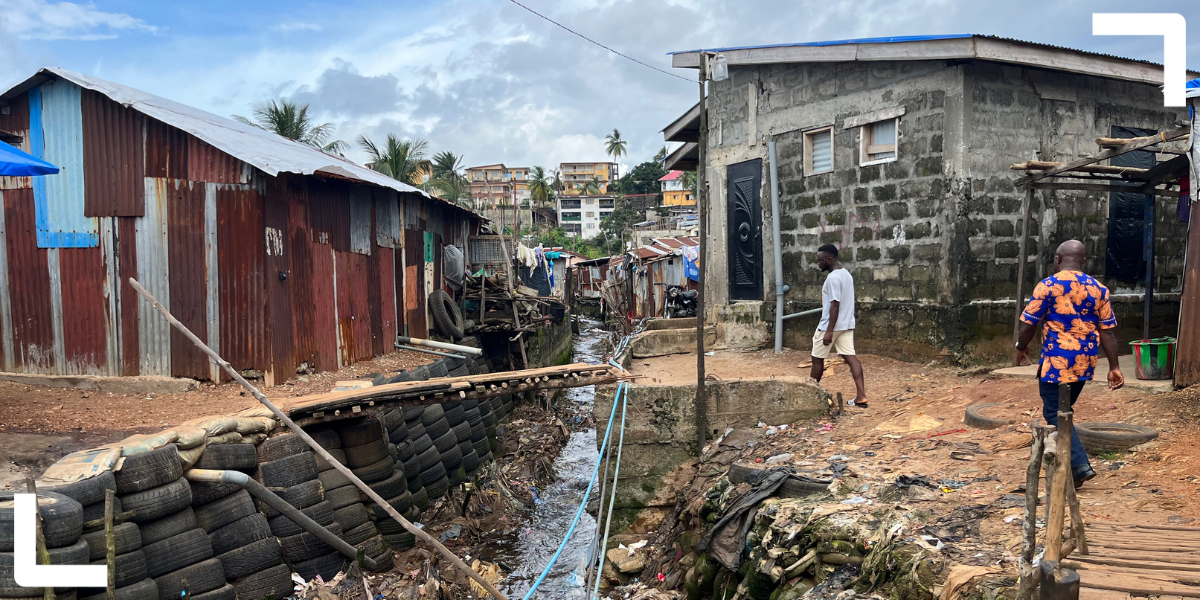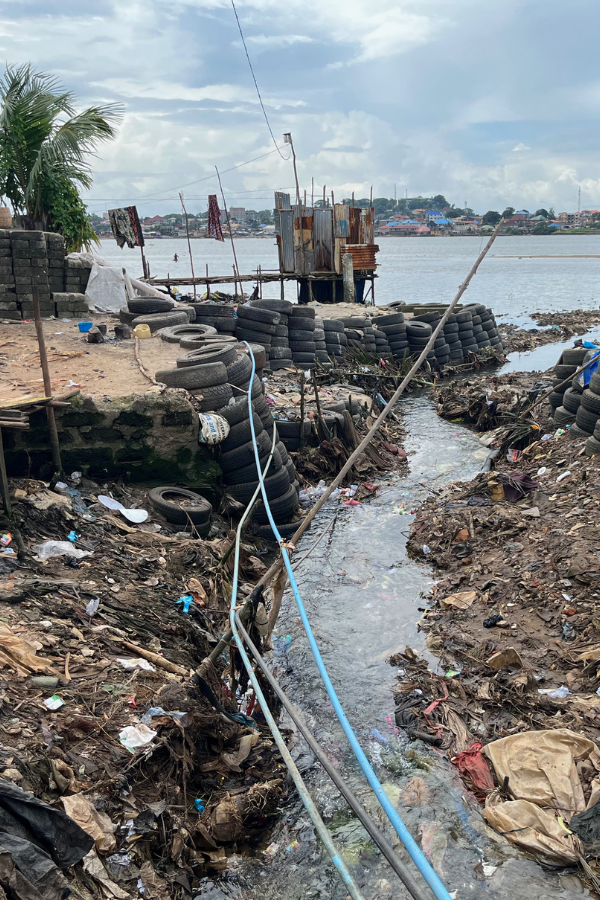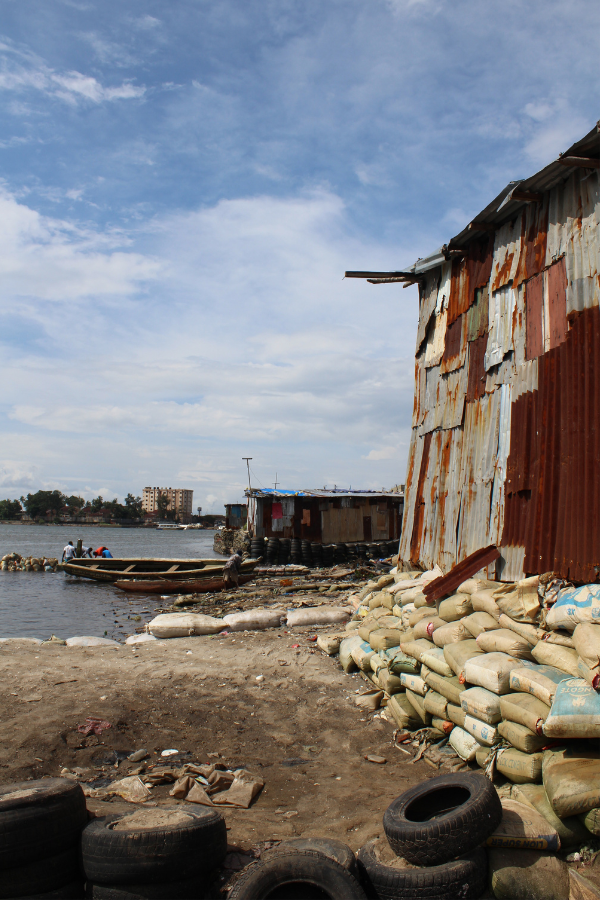The informal settlement of Cockle Bay lies along the western coast of Freetown, Sierra Leone’s capital, and is home to more than 16,000 people. Proximity to the sea plays a prominent role in the lives of residents, delivering sustenance and employment. But it also heightens already significant housing challenges and means the settlement is susceptible to coastal flooding and rising sea levels.
From difficulties around drainage infrastructure and electricity connectivity, to rising costs of building materials and limited rights for tenants, access to housing is a pertinent issue in Cockle Bay and other informal settlements in Freetown – and is a key focus of our research in the city.
Researchers from ACRC’s housing and informal settlements domains met in Cockle Bay to discuss the issues that the settlement’s residents are facing and possible ways forward. The below conversation has been edited for clarity and length.
Featuring:
- Alexandre Apsan Frediani – principal researcher in human settlements at the International Institute for Environment and Development (IIED) and co-lead of ACRC’s housing domain.
- Francis Reffell – founder and director of the Centre of Dialogue on Human Settlement and Poverty Alleviation (CODOHSAPA) and co-lead for ACRC’s informal settlements research in Freetown.
- Frank Bubu Kamara – co-researcher and volunteer at the Federation of Urban and Rural Poor, and a Cockle Bay resident.
- Ansumana Tarawally – research officer at the Sierra Leone Urban Research Centre (SLURC).
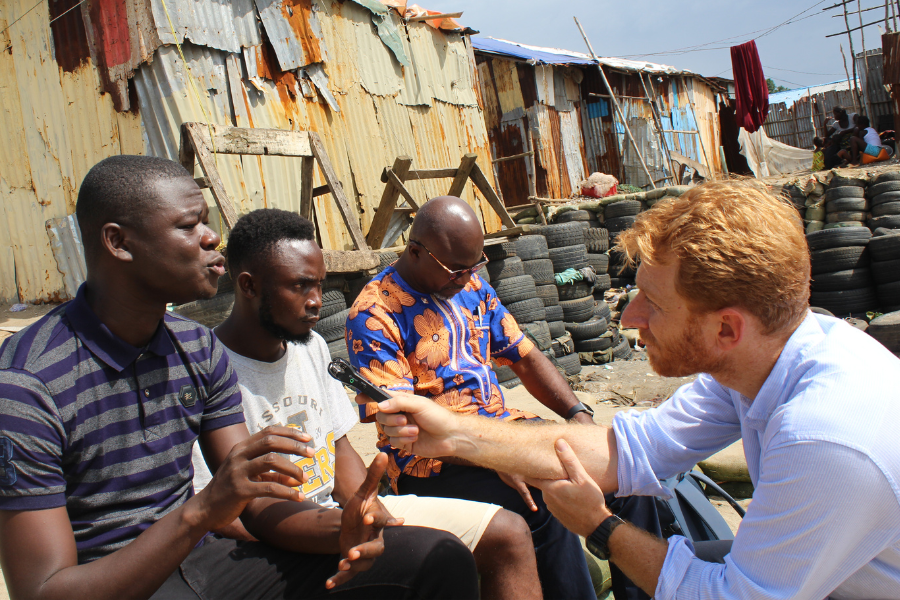
Alexandre Apsan Frediani Hello. My name is Alexandre Apsan Frediani, and I’m a principal researcher at the International Institute for Environment and Development. I’m also co-leading the housing domain of the African Cities Research Consortium, the ACRC. And today I’m here in Cockle Bay, which is an informal settlement in Freetown. And I’m joined by three very interesting people that have been engaged in the research at different moments. So I’m going to just ask them to introduce themselves.
Francis Reffell Hi, everyone. My name is Francis Reffell. I’m the founder and director, Centre of Dialogue on Human Settlement and Poverty Alleviation (CODOHSAPA), also pioneer for the Federation of Urban and Rural Poor. My involvement in the ACRC work is to co-lead on the informal settlement domain, at the same time as supporting uptake within Freetown.
Frank Bubu Kamara Hi, everyone. I’m Frank Bubu Kamara, a resident of Cockle Bay community, a coastal informal settlement. I’m also a co-researcher and a volunteer for the Federation of Urban and Rural Poor, Sierra Leone.
Ansumana Tarawally Hello, everyone. I’m Ansumana Tarawally. I’m a research officer for the Sierra Leone Urban Research Centre and I’m also a researcher working on the housing domain for ACRC and city of systems.
Alex Brilliant. Thank you for being here with us and Frank, thank you especially for welcoming us to Cockle Bay. I wonder if you could tell us just a little bit about Cockle Bay. What makes Cockle Bay special? Give us a bit of a flavour of how it is to live in Cockle Bay?
Frank Okay. First, to start with the name Cockle Bay. It’s a coastal informal settlement that is located in a western area of Freetown, the capital city of Sierra Leone. And starting with the word “cockle”, we get these from the sea. So originally this is how we originated the name Cockle Bay, from the cockles we get from the sea. And Cockle Bay is divided into four zones – Jai Mata, Hilet View, Mafengbeh and Kola Tree where we’re currently at – and it’s a very populated community.
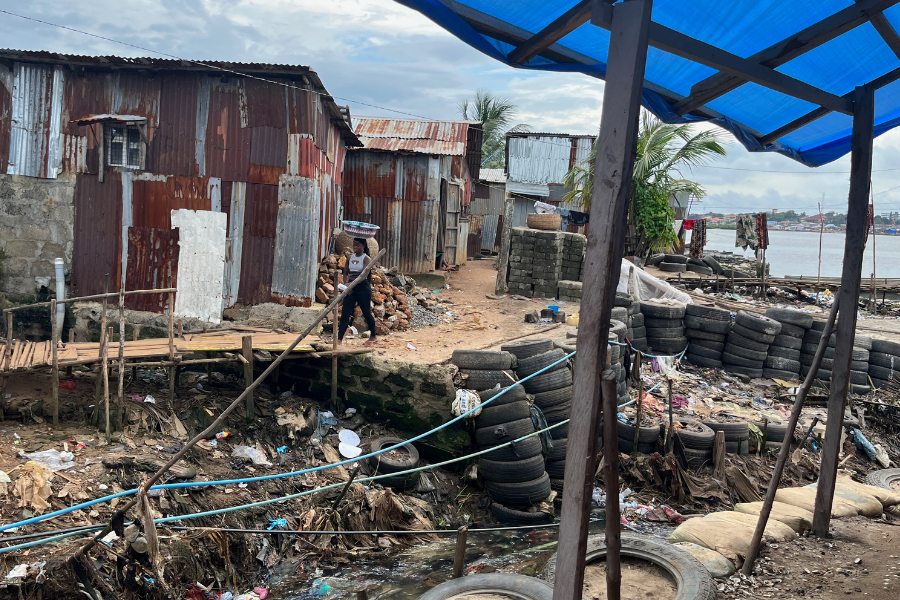
Alex So how many people live in Cockle Bay and how close is it to Freetown city centre, just to give a sense of where it is?
Frank According to our last data that we collected, we have over 16,000 population in Cockle Bay. It is very close to the central part of Freetown; if you just take a walk from Mafengbeh or Jai Mata you will soon reach the centre.
Alex Just walking here, we saw how dynamic and how vibrant it is, right? We saw so many people getting together, their shops, people sharing with us how they use cockle shells to even for making the neighbourhood more beautiful. So it’s a really special place. What makes Cockle Bay special for you?
Frank Probably I would say the source of living in this community, is something very special that you can’t always find in other coastal communities, like the fishing, the sand mining. And also because residents of Cockle Bay are very much a community.
Alex Thanks. Now maybe let’s talk a little bit about the housing because we have been studying a lot the housing conditions in Freetown. Maybe describe to us what you see as some of the main housing challenges here in Cockle Bay, in your opinion, Frank?
Frank First, I want to talk about the different types of housing, because they all have their own different challenges. We have the building that is made of mud blocks, and we have the cemented, concrete blocks, and we also have the zinc house. Generally, the zinc house is the house of Cockle Bay residents. And the increment of prices is very much affecting housing conditions in our community.
So we really have had a lot of challenges over the years. Our communities know that to construct with drainage, electricity, living in a community like this is very difficult, because the current can pass through the zinc house. And so we have very poor electricity connection in our community, we are living very close to the sea and we have poor drainage construction, so we are prone to a lot of disaster from the sea. So for the housing conditions this is very critical.
Alex Ansu, you’ve been doing a lot of research in various different localities in Freetown and also in Cockle Bay, where you have been doing some of your data collection. Could you share with us what have been some of the top challenges that you identified in your research, that relates to what Frank was just telling us about Cockle Bay?
Ansu Frank mentioned just now about the increase in prices, and one of the things that stood out in our research was the high cost of building materials. And also bringing the materials here to Cockle Bay is really a challenge because – as you can see on the southern side – there is the sea, and the road network within the community is really poor. So along with the cost of acquiring these materials, bringing supplies into Cockle Bay was identified as a huge challenge.
Alex How about some of the challenges related to the people that live out of rent and tenants’ rights issues? And could you tell us the number of people that live out of rent in Cockle Bay? Is it the majority?
Frank Well, the majority. I would say, 55 to 45%. Because the way our people used to acquire their land, if you take a look at this point – from that bag to this bag belonged to one person – and from this point where we are sitting to that point belonged to another person. So that means a huge amount of the population acquired land.
“The price of building materials is not only affecting the construction of houses, it’s also increasing the number of individuals living in one space.”
– Ansumana Tarawally
Alex And for those tenants that are living in Cockle Bay, what can protect them against rogue landlords and exploitation? Could you tell us a little bit about their experience, Ansu?
Ansu Well, firstly, most are requesting for more than one year payment of rent, which to me is a huge challenge, considering the economic situation of not only the city but Cockle Bay itself. That’s really huge on them. So if there is something that can come in for that aspect, I think it can help a lot.
And looking at the housing conditions and the amount they ask for these houses, it’s really huge. Most of the houses don’t have the basic infrastructure and just like Frank described, the environment means it’s a challenge to even bring these facilities, but they sometimes assume these facilities in the cost of the houses.
Then, similarly, the landlords are not interested in maintenance of these houses. They care about having somewhere to stay for themselves and the rest is a business for them. So they rent it out to people, asking for two years’ payment. And when they ask, they first say the maintenance is on them. But when you are living there, the situation is different. You have to take care of your safety in the house, you have to take care of maintenance and all that. And the price has not been factored into the rent. So they keep on increasing it, not even taking into account how much you are doing to maintain the house over time.
Alex And you told us before about the increased price of building materials. That, I guess, has to do with Covid, it has to do with the war in Ukraine, as well as increased fuel prices that impacted transportation. How do you see that impacting tenants themselves? Has some of this cost trickled down to the tenants? Have there been challenges in terms of improving the houses where they are living?
Ansu Well, it would be a question for Frank to give some data about the proportion of construction now and before; how has that changed over time? Because it was clear from the research that the cost of building materials has increased by over 100% in some cases. And considering the situation here, most of the people within this community rely on rent, even though they are saying there is land – reclaimed land, just a small portion – so everyone can get it. But the population keeps on increasing. As you mentioned, people are coming from the provinces, adding to the already 16,000 population that is living here in Cockle Bay.
So I think the price of building materials is not only affecting the construction of houses, it’s also increasing the number of individuals living in one space. Because when the cost of building materials increases, the production decreases. And considering that people are coming in on a daily basis into the community, there will be less houses to accommodate these people. So with a huge number of people living in an enclosed environment, they have been prone to diseases and other conditions.
Alex Frank, could you tell us a little bit about this process that Ansu was explaining?
Frank Looking at the changes of price from before the Covid-19 to now, like Ansu clearly said, a 100% increment has been taken and it is affecting a cross-section of the community. I don’t want to say the tenant or the landowners – it is affecting the two sides, both the tenants and the landowner. Because when the price increases for the building materials, the landowner also increases the price for the house. So because the price has increased, it has also reduced the number of houses constructed within this time.
So that has also led to people living in cluster situations – maybe five, six, ten people living in just one single room – because to acquire a place now, even if you want to be a tenant, it is very expensive. If you take the women in this community, they decided to come together, maybe three, four of them going for one room, especially in this particular community, Kola Tree. It is more common here for four or five women to rent a room. And also with youth, but it is more practised by the women.
“If people organise and they have a common voice, it always has the weight to influence change, at a local level, at another level. So I think the only window of opportunity is grassroots mobilisation.”
– Francis Reffell
Alex Thank you very much, Frank. Francis, you’ve followed issues related to housing securities and housing rights in Freetown for many years. How would you compare the situation today compared to previous struggles that have happened in Freetown? How do you see the situation that Ansu and Frank were describing? And if you think of it historically, how would you compare it?
Francis Thank you very much, Alex. And thank you to Ansu and Frank for their submissions. If we have a historical account, what I knew about Freetown before, in the formal and even in the informal sector, was housing rental was on a monthly basis. But over time, housing has become a kind of private enterprise, in which people think that it’s a way of getting household income to support their domestic needs and even for further investment. This actually happened with the turn of events caused by the war. After the war, or during the war and in the post-war scenario, a lot of NGOs came in and they started hiring private homes and they were willing to pay dollars. So there has been a shift from leone housing rental to dollar housing rental.
So, even if somebody is demanding leone, you always charge it in dollars, then probably you negotiate, “okay, I can pay you in the leone equivalent”. And again, it also shifted from monthly renter to annual renter, because the NGOs say, “okay, I’ll just pay upfront for three or four years”. So now, that has influenced every part of the housing market and has really taken a toll.
Within formal and informal settlements, that trend has continued – despite the kind of vulnerability and poverty situation of informal settlement residents – to the point that land or shack owners also see their houses as a source of income. So if they want to maximise profit from that, they have to go with annual rental. And also because of the inflation of leones, somebody who charges 100 leones on a monthly basis, for example, will calculate that if they’re paid upfront for a year, that’s 1,200 leones they can invest into something.
So market forces have taken a toll on people’s livelihoods and people’s survival within the city. But there seems to be no remedy in sight that’s coming, because the policy framework around those issues is completely absent. And so how do people engage and try to resolve this? I think it is going to continue as it is now, which means that the situation is going to become more and more difficult for those that are in housing rental situations.
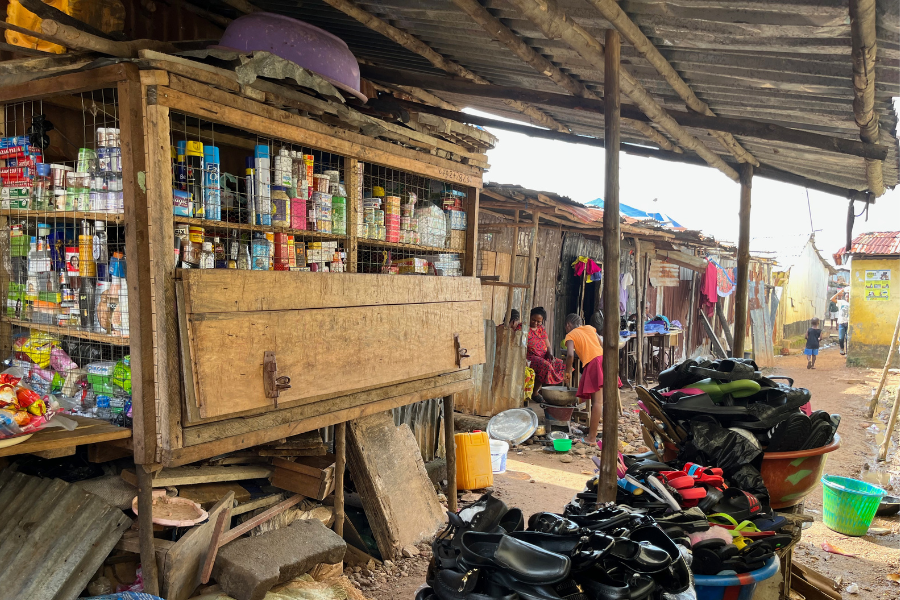
Alex Thank you very much for this very comprehensive analysis, historically, of the housing situation. But if we were to think of concrete actions immediately, if you think about ways to protect tenants, for example, against some of the issues that we’re discussing, what is the avenue for that? What do you see as some more immediate actions or processes that could help to start addressing this situation?
Francis Maybe if I can look at it from the very grassroots level, like Frank said and even other studies have shown, there are more tenants than landlords. So as somebody that is supporting community mobilisation and organisation, when you engage sometimes, some tenants would say, “well, I’m not a landowner here, what’s the point?” But I think it’s an opportunity for tenants as well to begin to organise themselves, and to position themselves, and take certain decisions with respect to issues of rentals. Although one thing I know about context is that if people organise and they have a common voice, it always has the weight to influence change, at a local level, at another level. So I think the only window of opportunity is grassroots mobilisation. People who are affected by common issues come together, and take a common position and negotiate around those issues.
“Policymakers should revisit those policies, because it’s time to make them applicable to the current population now. I do believe with that, we can have better housing and improve society and our community.”
– Frank Bubu Kamara
Alex Fantastic, thank you very much. Let’s get one final word from each of you. If we look ahead, what are the kind of immediate actions that you think are going to take place, where you see that there is possibility for change? Where would you put your efforts? And where do you think that there is energy to bring about change?
Frank Okay. Before the civil war, I do believe at first Sierra Leone had less population, and if you check the national land policies, all the government policies are totally against people living in informal settlements. So if you go to the coastal area and you ask the tenants, they will tell you that because of a policy that can ask them to vacate the premises within the shortest period of time, that is why people are constructing zinc houses. So the policymakers should revisit those policies, because it’s time to make them applicable to the current population now. I do believe with that, we can have better housing and improve society and our community.
Alex Thank you, Frank. How about for you, Ansu?
Ansu As he rightly mentions, reviewing those documents is really key. But I think dialogue is something that can work as well, because most of them are not really aware of the situation itself and the impact it is having on people. Why are they really building these kind of houses? Why are they living in such conditions? And it has grown so much that the kind of houses we are seeing here are not only in the informal settlements; you can see a well-established structure, and just by the side there is a shack as well. So it is really high time to bring together those that really matter to have this discussion again.
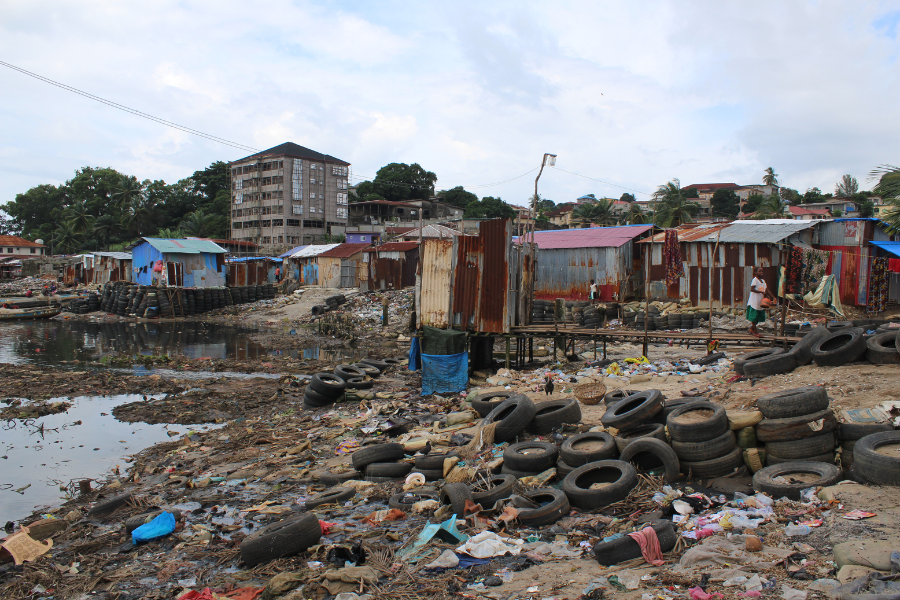
Alex Francis, what’s going to make these powerful actors come to the table and make the kind of changes that Ansu and Frank are calling for?
Francis Starting from the bottom upwards, the tenants and landowners, they have a common denominator – that’s illegality. The ownership is illegal, and the tenancy is illegal. So I think with the common ground like that, they need to come together to create a common voice. And I’ve always said that if you really want to change the stories, in a more scaleable manner, then those who are directly affected by this situation should really establish a common frontier and raise their voices. Where we are providing the kind of support, the technical nuances, for them to be able to engage, that can only take effect if they are the ones creating that voice – because there’s so much power in citizens’ voices. That is one component. In the other part of their engagement, especially around housing, they have to demand issues of tenure security, they have to demand issues of regularisation of rental issues, and they have to also engage government about the local material production that could drive down costs of housing and marketing. I think if that happens, then a lot of changes will go within the housing sector.
Alex Brilliant. Thank you so much, the three of you. It was a wonderful conversation, and thank you for welcoming us here in Cockle Bay. I’m looking forward to continuing this conversation and the next steps of our work together. Thank you so much.
Hear more about ACRC’s work on housing and informal settlements via our podcast.
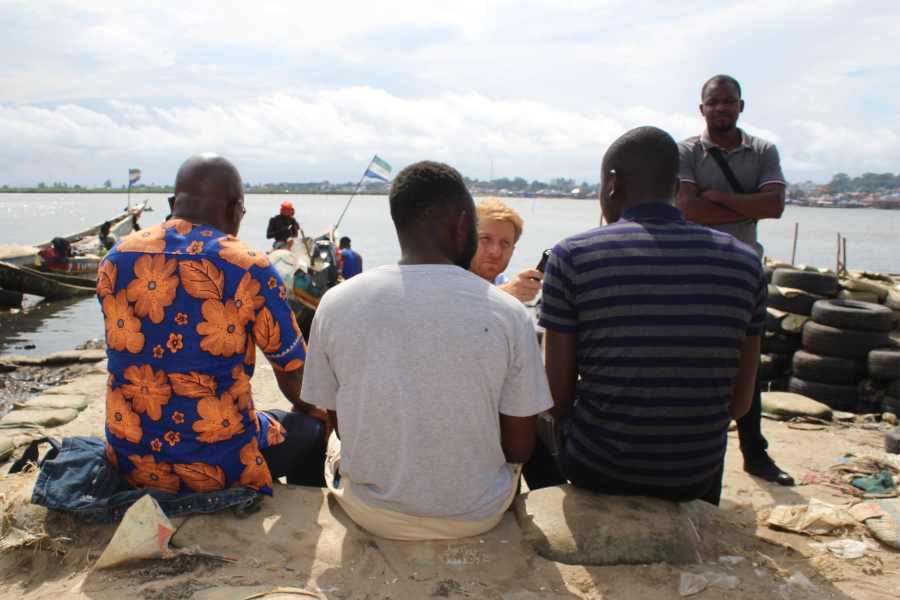
Photo credits: Alexandre Apsan Frediani; ICLEI Africa
Note: This article presents the views of the author featured and does not necessarily represent the views of the African Cities Research Consortium as a whole.
The African Cities blog is licensed under Creative Commons Attribution-NonCommercial-NoDerivatives 4.0 International (CC BY-NC-ND 4.0), which means you are welcome to repost this content as long as you provide full credit and a link to this original post.

